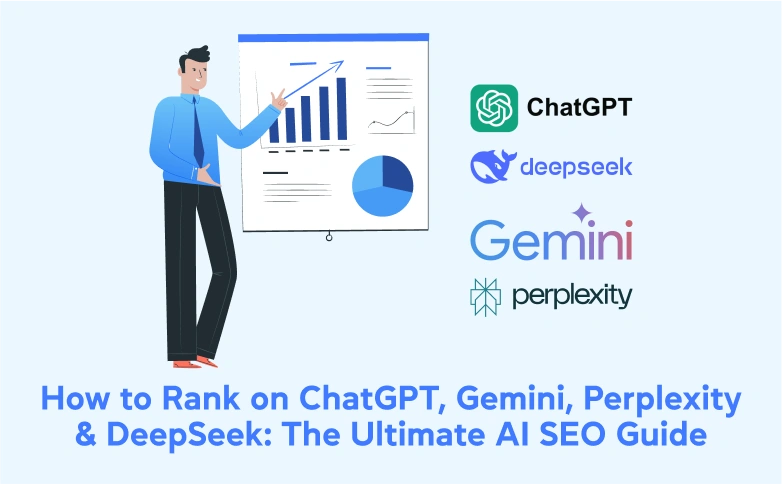How to Rank on ChatGPT, Gemini, Perplexity & DeepSeek: The Ultimate AI SEO Guide
What happens if ChatGPT, Gemini, or Perplexity start sending your competitors traffic instead of you?
More importantly: are you ready for a world where more customers find answers through AI assistants than traditional search engines?
This isn’t the future. It’s already happening.

Stat check:
-
- A 2024 Gartner survey predicts that over 30% of online searches will start with AI assistants or chatbots by 2026 — up from less than 5% in 2023.
-
- Research from BrightEdge found AI-powered answers are already diverting up to 25% of clicks that once went directly to websites.
If you don’t adapt, you risk missing a rapidly growing source of organic traffic. But if you do, you’ll be ahead of 95% of your competitors.
Here’s how to optimise your site so you rank in ChatGPT, Google Gemini, Perplexity, DeepSeek, and the next generation of AI-powered search. Talk to your local SEO agency to find out more and make sure that your business is staying ahead of the AI game.
1. Help AI Crawlers Find and Read Your Site
Recheck your robots.txt file
Remove unnecessary blocks in your robots.txt that might prevent Bing or other AI crawlers from indexing your pages. Remember: ChatGPT’s browsing relies on Bing’s index, so if Bing can’t reach your site, ChatGPT can’t either.
Optimise technical SEO
A solid technical foundation helps AI and traditional crawlers understand and rank your content accurately. Focus on these key steps:
- Maintain a clean site architecture: Keep navigation logical, with important pages no more than three clicks from the homepage. Add breadcrumb navigation for better hierarchy.
- Submit an XML sitemap: Create a sitemap using tools like Yoast, Rank Math, or Screaming Frog, and submit it to Google Search Console and Bing Webmaster Tools.
- Fix broken links: Use tools like Screaming Frog, Sitebulb, or Ahrefs to find and repair broken internal or external links.
- Strengthen internal linking: Connect related pages with clear, descriptive anchor text, and prioritise links to cornerstone or high-value content.
- Improve page speed: Optimise images, enable caching, and minify CSS/JS to speed up load times. Use PageSpeed Insights or GTmetrix for diagnostics.
- Ensure mobile usability: Run Google’s Mobile-Friendly Test to make sure your site works well on all devices.
- Minimise crawl errors: Regularly check Google Search Console and Bing Webmaster Tools for 4xx/5xx errors and resolve them promptly.
Don’t over-engineer small sites
For small or mid-sized sites, sticking to crawlability, fast load times, and straightforward navigation is usually enough. Advanced tactics like custom crawl budgets or overly complex CDNs can add unnecessary complexity without measurable benefits.
Submit to Bing Webmaster Tools
Since ChatGPT’s web browsing is powered by Bing, submitting your sitemap there ensures your pages are discoverable by AI models.
2. Create Content AI Wants to Cite
Unique and authoritative content
Share something new: original research, first-party data, expert interviews, or case studies with concrete results. Unique insights set your content apart from generic posts and AI models prefer citing fresh, authoritative sources.
Use natural language and FAQs
Write in a conversational tone, and include FAQs matching how people actually ask questions in AI tools. Example: Instead of “SEO best practices,” try “What are the best SEO practices for small businesses?”
Clear, structured formatting
Use headings, bullet points, tables, and short paragraphs. Structured, skimmable content makes it easier for AI to parse, summarise, and cite accurately.
Keep content fresh
Update older posts with current stats, trends, and examples. Outdated content is less likely to be cited by AI systems.
3. Build and Grow Brand Authority
Get mentioned in high-authority sources
Being cited by reputable sites signals credibility to both search engines and AI models. Aim for mentions in:
- Wikipedia: Contribute or get listed if your brand meets notability guidelines.
- News sites: Publish press releases or pitch your expertise to journalists. Services like HARO can connect you with reporters.
- Industry-leading blogs: Offer guest posts or unique insights to authoritative blogs in your field.
- SaaS and product directories: Listings on G2, Capterra, or Trustpilot send trust signals to AI systems.
- These mentions act like endorsements, making AI models more likely to feature your content in responses.
Use consistent entity data
Keep your brand name, logo, authorship, and other details consistent across your website, social media, schema markup, and directories. This helps AI recognise your brand as one authoritative entity, not multiple inconsistent sources.
Engage in online discussions
Share thoughtful answers on Reddit, Quora, LinkedIn, and industry forums. These can get cited by AI systems pulling insights from across the web.
Manage your online reputation
Monitor mentions of your brand, correct inaccuracies, and respond to reviews. AI models increasingly consider sentiment and reputation when generating answers. 4. Optimise for Different AI Search Engines
4. Optimise for Different AI Search Engines
ChatGPT (Bing + Microsoft Index)
- Follow Bing SEO best practices: keyword relevance, structured data, clean schema.
- Use concise, direct language for easy summarisation.
Google Gemini (Google Search + LLM Summarization)
- Standard Google SEO applies, but make sure you emphasise E-E-A-T (Experience, Expertise, Authority, Trust).
- Optimise for featured snippets, “People Also Ask,” and passages.
Perplexity
- Provide precise, fact-based content with data points AI can cite directly.
- Structure pages with stat boxes, lists, or short answers for easy extraction.
DeepSeek
- Prioritise multilingual, locally relevant content if targeting non-English markets.
- Use native-language keywords and reliable citations.
5. Implement Structured Data
Why structured data matters
Schema markup helps search engines and AI models understand your content’s context, purpose, and credibility. This increases your chances of being accurately cited in AI-generated answers and improves how your pages appear in search results.
How to use schema markup
Add relevant schema types to your website, such as:
- Organisation: For your company homepage or about page.
- Article: For blog posts, news, or resources.
- FAQ: For pages answering common customer questions.
- Product: For individual product pages in e-commerce stores.
- LocalBusiness: For service or retail locations.
When adding schema, include important fields like business name, address, logo, author information, and ratings to give AI models and search engines a complete understanding of your content.
Additional benefits of schema
Using structured data makes your pages eligible for rich snippets — including star ratings, FAQs, or product details — and increases your chances of appearing in knowledge panels. These enhanced search results are often used as sources in AI-generated answers, boosting your visibility even further.
6. Track and Adapt Your AI SEO Strategy
Monitor visibility on AI platforms
Use Bing Webmaster Tools to see how your site appears in Bing results, directly affecting ChatGPT browsing. Test your brand and key pages in tools like Perplexity, Gemini, and DeepSeek by running relevant queries to check how your content is cited or summarised.
Adapt as AI evolves
AI search is changing quickly, with new bots, crawling behaviours, and citation algorithms emerging regularly. Stay ahead by following updates from platforms like Bing Webmaster, Perplexity Labs, and Gemini, and by testing how your pages appear in AI-powered answers. Keeping your strategy flexible ensures you don’t fall behind as AI search technology evolves.
7. Optimise Content for Multimodal AI
Add multimedia content
Include videos, charts, images, and infographics that illustrate key points. These elements can improve engagement signals and increase the likelihood that AI will cite your content, especially when visuals reinforce your main ideas. For instance, a well-labeled chart comparing pricing plans can be summarised by an AI assistant in a relevant query.
Use transcripts and captions
Provide transcripts and captions for videos or audio content. AI language models rely on text to interpret multimedia, so these additions help AI parse, understand, and summarise your content more accurately.
Add descriptive alt text
Write meaningful alt text for every image or chart, improving accessibility and helping AI understand the context of your visuals.
Keep file sizes optimised
Large media files slow down pages, negatively affecting crawlability and user experience. Compress images and videos so they load quickly while maintaining quality.
Bonus Tips to Get Ahead in AI SEO
Get listed where it matters
Beyond backlinks, secure listings on high-authority directories like Crunchbase, G2, and Capterra, or niche directories in your industry. These listings send powerful credibility signals to AI crawlers.
Think like your users — and AI
Use long-tail keyword phrases matching how people ask questions in AI tools. For example, instead of “CRM software,” target real queries like “What’s the best CRM for startups in Australia?” AI assistants are designed to pick up content that mirrors conversational search intent.
Show off your expertise
Add expert bios with credentials to key pages and blog posts. Highlight certifications, years of experience, or notable achievements. This builds trust with visitors and helps AI systems assess your authority — a major factor for being cited in AI-generated answers.
Final Thoughts: Beyond AI SEO
AI-powered search isn’t coming; it’s already here. By making your site easy for AI crawlers to access, creating unique and authoritative content, and adapting your strategy as AI evolves, you can stay ahead of competitors still focused solely on traditional SEO.
Beyond search and chatbots, AI agents — like emerging personal AI assistants that proactively complete tasks, make recommendations, or handle bookings — will rely heavily on the same content and structured data. By working with a trusted and experienced SEO agency, you can optimise your site and ensure your business is ready not just for today’s AI answers but also for tomorrow’s AI agents acting on behalf of customers.








